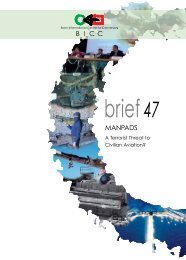egypt-final-presidential-elections-2012
egypt-final-presidential-elections-2012
egypt-final-presidential-elections-2012
Create successful ePaper yourself
Turn your PDF publications into a flip-book with our unique Google optimized e-Paper software.
The Carter Center<br />
Electoral Dispute Resolution<br />
Effective, clear, and fair procedures for electoral<br />
dispute resolution are an essential part of a<br />
well-functioning electoral process. 172 Voters and<br />
other electoral stakeholders must be given a voice in<br />
the quality of the electoral process if the process is to<br />
retain credibility. 173<br />
The PEC is authorized to decide upon all<br />
complaints and challenges related to the <strong>presidential</strong><br />
election. 174 The Law Regulating the Presidential<br />
Election defines a series of election crimes and other<br />
violations and establishes penalties for many of these<br />
violations. 175 The PEC appeared to take a more<br />
proactive role than its parliamentary counterpart, the<br />
SJCE, in addressing allegations of electoral misconduct.<br />
It announced the initiation of or the transfer of<br />
campaign and election day-related complaints to the<br />
Egyptian courts. On election day itself, polling station<br />
judges filed charges against alleged violators in local<br />
courts across Egypt. 176 Unfortunately, neither the<br />
PEC nor the Office of the General Prosecutor, the<br />
office responsible for investigating and, if warranted,<br />
charging election violators, maintained consolidated<br />
records of electoral disputes and their resolutions.<br />
During both rounds, there did not appear to be an<br />
attempt by the PEC to educate the Egyptian public<br />
on the right to file complaints regarding alleged incidents<br />
of electoral misconduct, and on why it is important<br />
that the public do so. In most instances, the PEC<br />
either referred complaints to the general prosecutor’s<br />
office or initiated their own claims alleging campaign<br />
violations with the general prosecutor’s office. It<br />
is unclear when investigations conducted by the<br />
prosecutor will conclude and whether decisions or<br />
other information regarding these cases will be made<br />
publicly available in an accessible manner. The lack<br />
of clarity regarding the timeline for decision-making<br />
and the opaque stance of the PEC in providing<br />
information on the dispute resolution process are<br />
cause for concern and are not consistent with international<br />
best practice requiring that information on<br />
appeals and the dispute resolution system be readily<br />
available. 177<br />
Adjudicatory Decisions of the PEC Following Both<br />
Rounds of the Presidential Election: Pursuant to<br />
its authority under Article 36 of the Law Regulating<br />
the Presidential Election, the PEC announced on<br />
May 28 its decisions on all appeals that were filed by<br />
candidates following the announcement of preliminary<br />
results of the first round. Candidates Hamdeen<br />
Sabahi, Abdel Moneim Aboul Fotouh, Ahmed<br />
Shafiq, and Amr Moussa filed a total of seven appeals.<br />
The allegations contained in the appeals included,<br />
among other allegations, claims of illegal voting,<br />
including by people unauthorized to vote (police/<br />
military) or people voting on behalf of the deceased,<br />
other forms of vote fraud (e.g., ballot tampering),<br />
denial of full access during all operating hours for<br />
candidate agents to electoral sites, and legal arguments<br />
that elements of the electoral laws were unconstitutional<br />
and should, therefore, result in the voiding<br />
of the <strong>final</strong> results.<br />
172 U.N., ICCPR, Article 2(3), “Each State Party to the present<br />
covenant undertakes: (a) to ensure that any person whose rights or<br />
freedoms are herein recognized as violated shall have an effective remedy,<br />
not withstanding that the violation has been committed by persons<br />
acting in an official capacity; (b) to ensure that any person claiming such<br />
a remedy shall have his right thereto determined by competent judicial,<br />
administrative or legislative authorities, or by any other competent<br />
authority provided for by the legal system of the State, and to develop<br />
the possibilities of judicial remedy; (c) to ensure that the competent<br />
authorities shall enforce such remedies when granted.”<br />
173 UNHRC, General Comment 32, para. 25: “The notion of fair trial<br />
includes the guarantee of a fair and public hearing.”<br />
174 Article 8(11), Law Regulating the Presidential Election<br />
175 Articles 42–56, Law Regulating the Presidential Election<br />
176 The PEC reported to The Carter Center that polling station judges<br />
filed approximately 250 complaints during the first round of the election.<br />
177 U.N., CESCR, civil and political rights, including the questions<br />
of independence of the judiciary, administration of justice, impunity,<br />
para. VIII.12.a; AU, African Commission on Peoples’ and Human<br />
Rights, Principles and Guidelines on the Right to a Fair Trial and Legal<br />
Assistance in Africa, Article 3<br />
64



